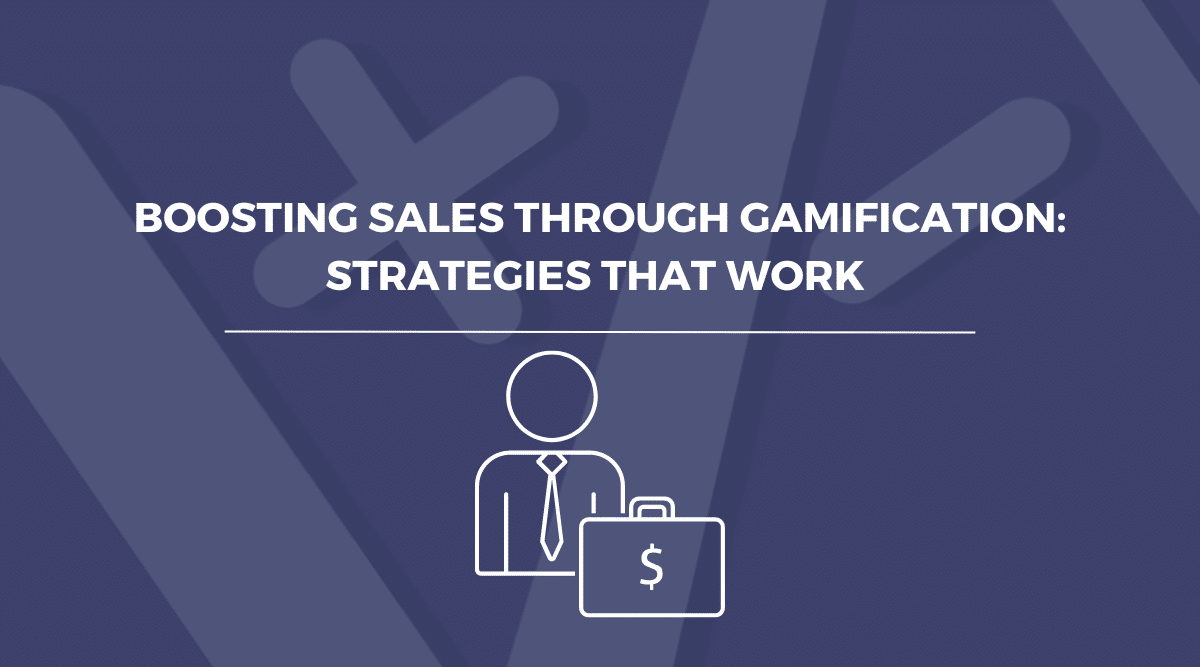Revolutionizing Sales with Gamification
In the competitive world of sales, maintaining a high level of team engagement, motivation, and performance is essential for success. Traditional strategies have their strengths, but the dynamic nature of sales requires innovative approaches that can captivate and motivate sales teams to achieve and exceed their goals. Enter gamification, a transformative strategy that brings game design principles into the sales process to create a compelling, competitive, and rewarding environment. This blog explores how gamification can significantly increase sales by utilizing human psychology and technology, making the sales journey not just a target to be achieved but an exciting journey to embark on. Through the lens of proven strategies, we’ll uncover the secrets to enhancing sales performance and cultivating a thriving sales culture that reaches and surpasses its goals. Join us as we explore the game-changing power of gamification in sales, providing a roadmap for organizations ready to enhance their sales game to unprecedented levels.
Understanding the Psychology of Gamification
Gamification leverages deep-rooted psychological triggers to enhance sales team performance. At its heart, it taps into the innate human desires for competition, achievement, recognition, and reward. These elements, when thoughtfully integrated into sales strategies, can significantly elevate motivation and engagement. Understanding this psychology is crucial; it’s not just about adding game mechanics superficially but embedding them in a way that resonates with the sales team’s daily activities and goals. By acknowledging and acting on these psychological principles, gamification transforms the sales process into a more compelling and motivational journey, driving teams towards higher productivity and success.
Enhancing Sales Performance with Gamification Techniques
Integrating gamification into the sales environment transforms traditional performance enhancement strategies into a dynamic and engaging experience for sales teams. This approach leverages the competitive spirit inherent in sales while fostering a positive, achievement-oriented culture. Key components include:
- Real-Time Performance Tracking: By utilizing advanced gamification platforms, sales managers can monitor team performance in real-time. This instant visibility encourages a culture of continuous improvement and allows for the immediate recognition of individual and team achievements.
- Customizable Rewards System: Tailoring a rewards system to align with specific sales goals and metrics significantly boosts motivation. By directly linking sales achievements to tangible rewards, organizations can create a compelling incentive for sales professionals to strive for excellence.
- Enhanced Engagement and Motivation: Gamification strategies make the pursuit of sales targets a more engaging and enjoyable experience. Celebrating milestones and visualizing progress through leaderboards or achievement badges cultivates a competitive yet supportive atmosphere. This not only keeps sales teams motivated but also aligns their efforts more closely with the broader organizational objectives.
- Fostering a Culture of Achievement: The implementation of gamification introduces a fun, game-like element to sales activities, encouraging healthy competition among team members. This environment promotes a deeper engagement with sales tasks, driving teams towards achieving their targets while enjoying the process.
By focusing on these gamification techniques, companies can foster a more vibrant, motivated, and productive sales environment. This enhances the performance of sales teams and contributes to the organization’s success and growth.
Technology and Tools for Gamification
The successful deployment of gamification in sales relies heavily on selecting the right technology and tools. Modern gamification platforms offer a suite of features designed to engage sales teams, track performance, and reward achievements in real-time. These platforms enable the creation of a gamified environment that is both motivating and measurable.
- Choosing the Right Platform: It’s crucial to select a gamification platform that integrates seamlessly with existing sales and CRM systems, ensuring that sales activities are accurately tracked and rewarded.
- Customization and Flexibility: The best tools offer customization options that allow organizations to tailor gamification strategies to their specific sales goals, team dynamics, and company culture.
- Analytics and Reporting: Advanced analytics capabilities are essential for monitoring the effectiveness of gamification strategies, providing insights into team performance, and identifying areas for improvement.
- Engagement Features: Features such as leaderboards, badges, and rewards systems are key to maintaining high levels of engagement and motivation among sales teams.
By carefully selecting and implementing the appropriate gamification technology and tools, organizations can enhance the sales experience, making it more productive, engaging, and enjoyable for all involved.
Measuring the Impact of Gamification on Sales
To gauge the success of gamification strategies in sales, it’s essential to measure their impact accurately. This involves tracking various metrics and key performance indicators (KPIs) reflecting gamification’s effectiveness in driving sales performance and engagement.
- Sales Performance Metrics: Key metrics include an increase in sales volume, higher conversion rates, and growth in average deal size, indicating a direct impact on revenue.
- Engagement and Participation Rates: Monitoring engagement levels and participation in gamification activities helps assess how well the strategies are being adopted by the sales team.
- Behavioral Changes: Observing changes in sales behaviors, such as increased proactive client engagement or improved follow-up practices, can be indicative of the gamification’s effectiveness in enhancing sales skills.
- Employee Satisfaction and Retention: Employee feedback and turnover rates can provide insights into how gamification affects team morale and satisfaction, which are critical for long-term success.
By closely monitoring these metrics, organizations can refine their gamification strategies, ensuring they are effectively motivating the sales team, enhancing performance, and contributing to the organization’s overall success.
Challenges and Considerations in Gamification
While gamification presents numerous benefits for boosting sales performance, implementing it successfully comes with its own set of challenges. Key considerations include ensuring the gamification strategy aligns with business objectives, maintaining fairness, and avoiding overemphasis on competition to the detriment of collaboration. It’s crucial to design gamification elements that motivate all team members, not just the top performers, to prevent disengagement or decreased morale among the team. Furthermore, organizations must navigate the balance between encouraging healthy competition and fostering a collaborative team environment. By addressing these challenges thoughtfully, companies can maximize the benefits of gamification and create a sustainable, productive sales culture.
The Future of Sales Lies in Gamification
As we’ve explored, gamification offers a powerful toolkit for re-energizing sales teams, boosting performance, and aligning sales efforts with organizational goals. By understanding the psychology behind gamification, implementing strategic game elements, and leveraging the right technology, companies can create an engaging and competitive sales environment. The challenges of gamification, while significant, are manageable with thoughtful planning and execution.
Looking ahead, the evolution of gamification will likely be influenced by advancements in technology, deeper insights into human behavior, and a growing recognition of its potential across various sectors. As organizations continue to seek innovative ways to motivate teams and enhance performance, gamification stands out as a key strategy for the future of sales.
For businesses ready to take on this gamified journey, the path forward involves careful consideration of their teams’ dynamics, a clear understanding of their sales objectives, and a commitment to fostering a culture that values achievement, recognition, and continuous improvement. The transformative power of gamification in sales is not just in its ability to entertain but in its capacity to inspire, motivate, and drive real business results.



